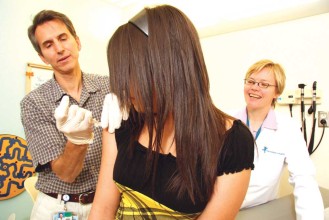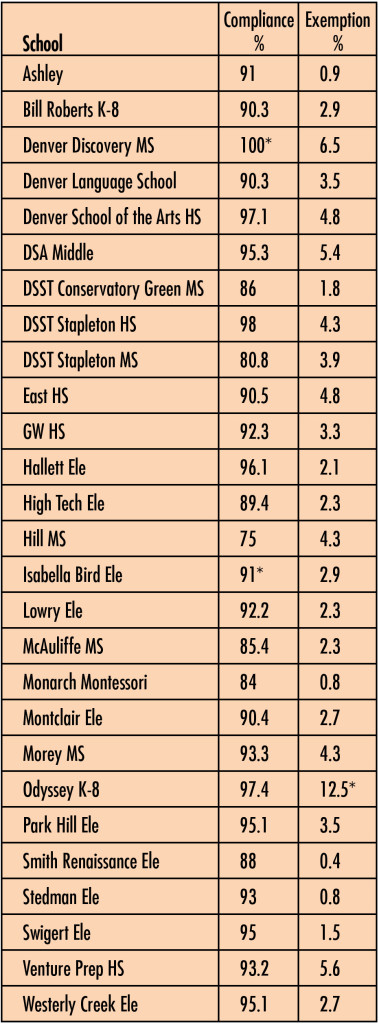 “I don’t think most parents would make the final decision about a school based on a vaccination rate, but the fact that they even think about it and now they’re talking about it is very important,” says Sean O’Leary, pediatric infectious disease specialist at Children’s Hospital. “Being able to see these rates offers parents one more piece of information when deciding where they want to send their child to school.”
“I don’t think most parents would make the final decision about a school based on a vaccination rate, but the fact that they even think about it and now they’re talking about it is very important,” says Sean O’Leary, pediatric infectious disease specialist at Children’s Hospital. “Being able to see these rates offers parents one more piece of information when deciding where they want to send their child to school.”
The data has become more accessible due to a 2014 state law that requires schools and childcare centers to make immunization compliance and exemption rates publicly available.
“Up until now, the things that we have heard about in the media have been from the anti-vaccine people— typically Jenny McCarthy and the people that are really on the fringe. But really, there’s this huge silent majority of parents who are vaccinating their kids. Only now, when we’re able to see these rates and we’re hearing about outbreaks because parents are refusing vaccines, we’re finally starting to hear their voices. The conversation may change because these parents now have a voice, and parents now have a choice. This piece of information goes along with everything else that they use to decide on where they send their child to school or childcare center.”
Though vaccine data may not typically be a major factor in parents’ decision making about their child’s school, “There are certain circumstances where it becomes more important. In the event of a large outbreak, then it becomes very important,” says O’Leary.
Park Hill resident Andy Sense experienced the second circumstance where vaccine rates are critically important. His child, at age 16 months, was diagnosed with cancer and went through two and a half years of treatment. “For my son, not only was he unable to maintain his vaccination schedule, but the chemotherapy for cancer killed his immune system altogether so he was doubly susceptible to any communicable diseases that came his way. For people who think this comes down to choice, I would hope that they would consider that many children in our neighborhood don’t have that same choice…What they have to depend on is that 95% of people who are vaccinated in order to create herd immunity.” Spence’s son, now five, has been cancer free for two and a half years, but they are looking closely at immunization rates at the schools they are considering for kindergarten.
Spence adds that although he understands the importance of personal choice, he thinks people also need to understand the limits of their own expertise and consider the overwhelming consensus of scientists who study immunizations.

Compliance in NE Denver Compliance rates do not show the percent of students immunized. They include the percentage of students who have gotten all required immunizations, have signed exemption forms, or are “in process” of getting up to date on their immunizations. The counts were taken by DPS during the week of Feb. 2. Asterisks (*) show counts that were updated by schools after the DPS report.
Brian Winn, an internal medicine doctor at Kaiser, has a daughter who had cancer several years ago, before vaccine rates were readily accessible and talked about. When going through that experience, he says vaccine rates weren’t what was on his mind, but, he adds, “I felt secure enough that when she went to school that a vast majority of kids had been immunized and by them getting immunized it was herd immunity protecting her when she needed it most.”
Winn speaks for parents of an immune compromised child. “I would certainly be very grateful to the community for lessening his/her risk. Especially for something we can’t control. You can’t control when a kid gets a cancer diagnosis. You can control her risks for exposure. The community can certainly decrease that risk, that’s for sure.”
Winn also expresses concern about healthy kids at a school with a high exemption rate. “I know the data quite well and I’m not remotely concerned (about the vaccines). I’m more concerned about the non-immunized kids getting a serious preventable disease than I am about the rare but serious complication from the immunization.”
In Colorado, parents have the right to sign an exemption form for personal reasons, even if there is not a medical or religious reason to withhold vaccines. A recent survey showed Colorado’s exemption rate is 4.3 percent. That may not sound high, but “that translates into about 3,000 kindergarteners that are entering school each year that aren’t fully immunized. That number carries some weight in terms of being out in the general community,” says Stephanie Wasserman, executive director of the Colorado Children’s Immunization Coalition. She says measles are “one of the most infectious agents on the planet” with a 90 percent infection rate. If 10 unimmunized children are exposed to measles, nine of them will get it.
Wasserman’s organization works to mobilize resources in the community to advance children’s health through immunizations, including awareness campaigns about the safety and efficacy of vaccines. “We believe there are a lot of people in Colorado claiming a personal belief exemption out of a convenience loophole. Maybe they don’t have a strongly held belief, they’re just filling out the paperwork because it’s convenient. We want to see if there’s the opportunity to talk to parents to see if they have strongly held belief.”
As a DPS parent for 19 consecutive years, Wasserman says, “I was one of the parents who was blissfully ignorant about this issue. I was the silent majority. I assumed that every other parent took their children regularly to the pediatrician and got them fully immunized.”
Donna Shocks, DPS head of nursing explains that compliance data is a moving target. Immunized students can have a birthday and fall out of compliance. “We’re always working on immunizations and immunization compliance. The lower the number of immunizations, the harder the nurses are working and the harder the school staff is working to reach out to parents.”
If kids aren’t in compliance Shocks says the nurses have to assess whether it’s a question of access or preference. “If it’s access we do everything to minimize whatever barriers they are facing to make sure the kids get immunized.”
If it’s preference, the school nurses offer more information or education. “Some people are pretty determined that they’re not going to do immunizations. We still offer as far as the parent will allow us to go, but it is such a fine line there. I can’t impose my beliefs on you. But if I can be of any assistance please contact me.”
An alphabetized list of all DPS schools and their compliance and immunization rates is available here. The Colorado Department of Health’s immunization schedule is available here.



0 Comments